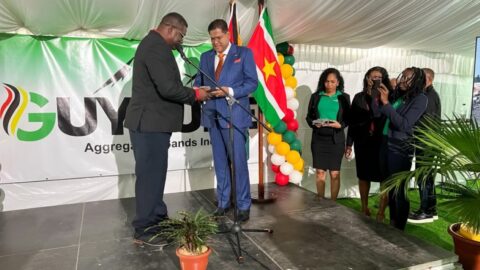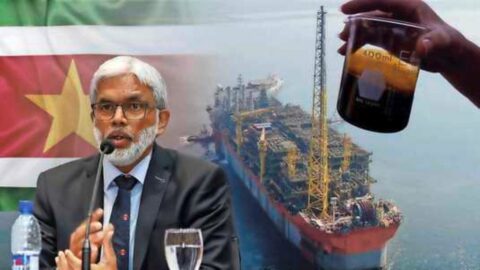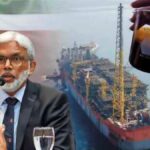Opinion: IMF Abruptly Turning Its Back on Suriname’s President Santokhi
Suriname’s Economic Crossroads: Unraveling the IMF’s Evaluation and Government Critique
Over the past three years, the Santokhi-Brunswijk government has consistently attempted to deflect responsibility for Suriname’s economic challenges onto the previous administration and agreements with the International Monetary Fund (IMF). However, this blame-shifting tactic serves as a diversion from the significant shortcomings of the current leaders.
The IMF, no longer tolerant of Santokhi’s deceptive strategies, feels compelled to directly and personally inform the Surinamese population. Hence, since the beginning of November 2023, the IMF has launched a charm offensive in Suriname. For the first time in its presence in Suriname, the IMF steps forward, openly visiting neighborhoods and community groups in Paramaribo. The goal is to firsthand understand how government policies are impacting people’s lives.
In the persona of Anastasia Guscina, the IMF dares to be critical of the Surinamese government, stating that its social policies are flawed, and poverty has increased due to outrageously low salaries. The ongoing protests from the coalition of unions now further highlight the dire situation faced by the people of Suriname. Even Suriname’s chief negotiator with the IMF, Karel Eckhorst, no longer hesitates to publicly express criticism of the government’s failing policies. The question arises: why has the IMF seemingly awakened after over 3 years, especially when it recently praised the Surinamese government for its “positive” economic progress? This appears highly contradictory. The IMF’s charm offensive and apparent critical stance toward the Surinamese government seem like an attempt to absolve itself, hiding the darker side of its true intentions. The IMF consistently claims to strive for global monetary stability and economic growth.
However, in Suriname’s case, it raises questions as to why the IMF allowed the unpaid coupon interest on the Oppenheimer bond to escalate, with the Surinamese government’s consent. By consistently not paying coupon interest on the outstanding debt of USD 675 million owed to Oppenheimer bondholders, this debt has risen to nearly a billion USD (USD 880 million). Is this the IMF’s method to promote monetary stability and economic growth in Suriname?
Through the agreed staff-level agreement, the IMF has essentially plunged Suriname into further debt. This colonialist approach has led Suriname to pledge Block 58, where most oil discoveries have occurred, under the guise of a ‘favorable’ haircut. Consequently, all royalty proceeds will be deposited into a bondholders’ account until December 31, 2050, until Suriname can meet its interest obligations.
In the international investment realm, it is customary that when an individual, company, or country has significant debts, debt restructuring or takeover is a strategy to effectively address severe debt issues. Total debts are then consolidated by a bank or financial institution, and new, revised debt is provided at a lower interest rate. This subsequently provides an opportunity to tackle the enormous debt burden and lay the foundation for progressive development policies.
It is a fact that the current government has made no productive progress in the past 3.5 years. How is it that the IMF ignores such blatant incompetence? Moreover, considering the government’s economic inactivity, it is naive to expect any significant development in the production sector in the next 1.5 years. Most concerning is the IMF’s apathy towards widespread corruption within the government. It appears that the IMF selectively turns a blind eye to these abuses. These critical issues are consistently ignored, which is unacceptable and alarming.
The IMF allowed Santokhi to pursue self-enrichment, corruption, and incompetent policies unchecked, and now it seemingly complains that the government’s domestic policies haven’t worked. It has been evident for a long time that the deficient policies of the Santokhi-Brunswijk government have led to the bankruptcy of many businesses, with no economic diversification, production increase, or export growth. A stable but excessively high exchange rate and inflation will not propel Suriname forward, leaving the country dependent on IMF financial support. Suriname will continue to humble itself, pleading for quarterly tranches earmarked for balance of payments support.
Date: 20 november 2023
Categories: Columns, Economische Crisis, Economische Nieuws, Internationale Nieuws, Staatsschuld, Suriname
Advertentie
Wilt u uw merk hier tonen?
Maak contact en ontdek de advertentiemogelijkheden!
Wilt u uw merk hier tonen?
Maak contact en ontdek de advertentiemogelijkheden!
– DISCLAIMER –
LocalContentSuriname.com is een portaal waar ondernemers, bedrijven en stichtingen zich willen presenteren. Deze website is niet verantwoordelijk voor de inhoud die op deze pagina getoond wordt. Alle informatie die op deze pagina wordt verstrekt, moet onafhankelijk worden geverifieerd. Er worden geen garanties of verklaringen gegeven voor de juistheid van de informatie. Ga naar veelgestelde vragen voor meer informatie.












